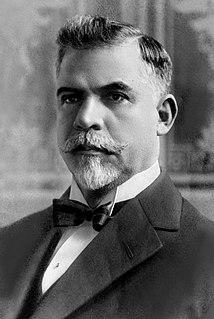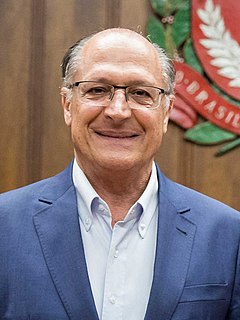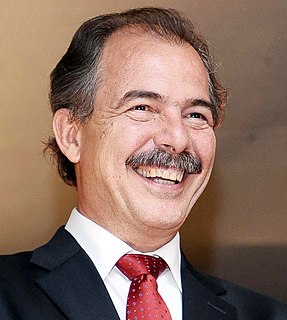
The politics of Brazil take place in a framework of a federal presidential representative democratic republic, whereby the President is both head of state and head of government, and of a multi-party system. The political and administrative organization of Brazil comprises the federal government, the 26 states and a federal district, and the municipalities.

Fernando Henrique Cardoso, also known by his initials FHC, is a Brazilian sociologist, professor and politician who served as the 34th President of Brazil from 1 January 1995 to 31 December 2002. He was the first Brazilian president to be reelected for a subsequent term. An accomplished scholar of dependency theory noted for his research on slavery and political theory, Cardoso has earned many honors including the Prince of Asturias Award for International Cooperation (2000) and the Kluge Prize from the US Library of Congress (2012).

Luiz Inácio Lula da Silva, known as Lula, is a Brazilian politician and former union leader who served as the 35th President of Brazil from 2003 to 2010. He was a founding member of the Workers' Party (PT) and ran unsuccessfully for president three times before achieving victory in the 2002 election. He was re-elected in 2006.

The Workers' Party is a political party in Brazil. Some scholars classify its ideology in the 21st century as social democracy, with the party shifting from a broadly socialist ideology in the 1990s. Founded in 1980, it is the largest left-wing party in Latin America. PT governed at the federal level in a coalition government with several other parties from 1 January 2003 to 31 August 2016. After the 2002 parliamentary election, PT became the largest party in the Chamber of Deputies and the largest in the Federal Senate for the first time With the highest approval rating in the history of the country, former President Luiz Inácio Lula da Silva is PT's most prominent member. His successor Dilma Rousseff, also a member of PT, took office on 1 January 2011 and was impeached in 2016.

Jânio da Silva Quadros was a Brazilian lawyer and politician who served as the 22nd President of Brazil from January 31 to August 25, 1961, when he resigned from office. He also served as the 24th and 36th mayor of São Paulo, and the 18th governor of the state of São Paulo. Quadros was known for his populist style of government, honesty, and eccentric behavior. As president, he focused on economic reform and attempted to root out corruption. He also pursued an independent foreign policy, trying to balance relations between the United States and the Eastern Bloc. Although he was elected by a huge margin, his term was marked by uncertainty and political instability, culminating in his resignation. That unexpected move caused national chaos, with the presidency being assumed by João Goulart.

Tancredo de Almeida NevesSFO was a Brazilian politician, lawyer, and entrepreneur. He served as Minister of Justice and Interior Affairs from 1953 to 1954, Prime Minister from 1961 to 1962, Minister of Finance in 1962, and as Governor of Minas Gerais from 1983 to 1984. He was elected President of Brazil in 1985, but died before he took office.

The Brazilian Social Democracy Party, also known as the Brazilian Social Democratic Party or the Party of Brazilian Social Democracy, is a political party in Brazil. As the third largest party in the National Congress, the PSDB was the main opposition party against the Workers' Party (PT) administrations of Luiz Inácio Lula da Silva and Dilma Rousseff from 2003 to 2016.

Prudente José de Morais e Barros was the third President of Brazil. He is notable as the first civilian president of the country, the first to be elected by direct popular ballot under the permanent provisions of Brazil's 1891 Constitution, and the first to serve his term in its entirety. His presidency, which lasted from 15 November 1894 until 14 November 1898, was marked by the War of Canudos, a peasant revolt in the northeast of the country that was crushed by the Brazilian Army. He also had to face a break in diplomatic relations with Portugal that was successfully mediated by Queen Victoria of the United Kingdom.

Francisco de Paula Rodrigues Alves, PC was a Brazilian politician who first served as president of the Province of São Paulo in 1887, then as Treasury minister in the 1890s. Rodrigues Alves was elected President of Brazil in 1902 and served until 1906.

Washington Luís Pereira de Sousa was a Brazilian politician who served as the 13th President of Brazil, the last of the First Brazilian Republic.

Júlio Prestes de Albuquerque was a Brazilian poet, lawyer and politician. He was the last elected President of Brazil of the period known as the República Velha, but never took office because the government was overthrown in the Revolution of 1930. Prestes was the only politician to be elected President of Brazil and then impeded from taking office. He was also the last person born in São Paulo to be elected president until the election of Jair Bolsonaro in 2018.

José Serra Chirico is a Brazilian politician who has served as a Congressman, Senator, Minister of Planning, Minister of Health, Mayor of São Paulo, Governor of São Paulo state, and Minister of Foreign Affairs of Brazil.

José Dirceu, in full José Dirceu de Oliveira e Silva, is a former Brazilian politician. His political rights were suspended by the Brazilian House of Representatives and he was found guilty by the Brazilian Supreme Court of active corruption and conspiracy in two separate lawsuits.

Geraldo José Rodrigues de Alckmin Filho is a Brazilian politician who served as the Governor of São Paulo from 2001 to 2006, and then again from 2011 to 2018. He was the Brazilian Social Democracy Party (PSDB) presidential nominee for the 2018 presidential election. He is usually described by political analysts and supporters as a pro-business centrist, closely associated with the political and financial establishment.

Eduardo Matarazzo Suplicy is a Brazilian left-wing politician, economist and professor. He is one of the founders and main political figures on the Workers Party of Brazil (PT). In the municipal elections of São Paulo in 2016 was consecrated as the most voted city councilor in the history of Brazil.

Aloízio Mercadante Oliva is an economist and Brazilian politician who served as the Chief of Staff of Brazil between 2014 and 2015. He was a founder of the Workers' Party in February 1980 and vice-chairman of the party between 1991 and 1999, then state senator from São Paulo between 2003 and 2010. From 2011 to 2012 he was Minister of Science, Technology and Innovation in Brazil, and in 2012 he became Minister of Education, due to Fernando Haddad's departure to run for mayor of São Paulo.

Plínio Soares de Arruda Sampaio was a Brazilian intellectual and political activist, who was affiliated with the Partido Socialismo e Liberdade (PSOL). He ran as a candidate for the presidency of the Federative Republic of Brazil in 2010.

Luiz Paulo Teixeira Ferreira, known as Paulo Teixeira, a Brazilian politician, lawyer, and professor who belongs to the Partido dos Trabalhadores. He is currently a federal deputy in the lower house of the Brazilian Parliament, where he served as PT party leader in 2011

The 1994 Brazilian presidential election was held on October 3, 1994. It was the second to take place under the provisions of the 1988 Constitution and only the second direct presidential election since 1960.

Paulo Cesar Hartung Gomes is a Brazilian politician and was the Governor of the Brazilian state of Espírito Santo from 2003 until 2010. He serverd as Governor of Espírito Santo for a third, nonconsecutive term from January 1, 2015 to January 1, 2019.




















